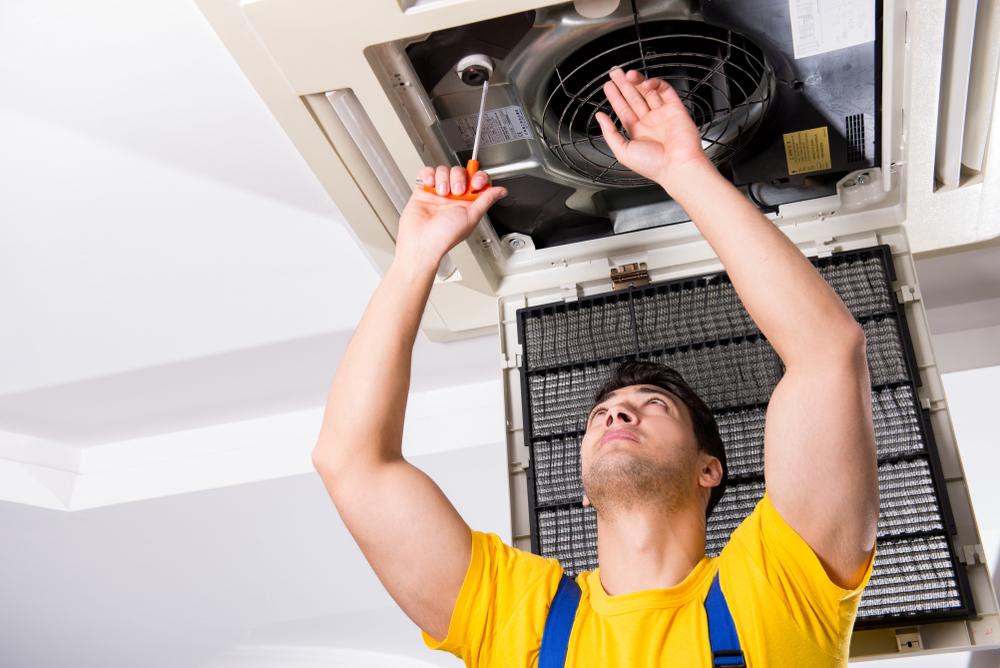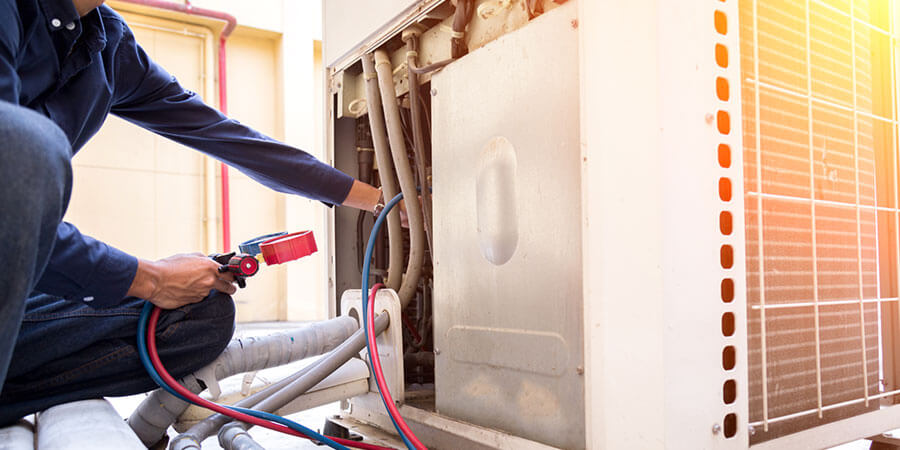heat pump service: What It Includes and Why It Matters
Selecting In Between a Heatpump and Furnace: Secret Factors To Consider for Your Heating And Cooling Demands
When examining heating options for HVAC requires, the decision in between a warm pump and a heater can be complicated. Each system provides distinctive benefits tailored to details environments and power effectiveness goals. Recognizing these differences is essential for making an enlightened choice. Trick elements such as installation costs and ecological effect further complicate the option procedure. Which option really straightens with one's convenience and sustainability preferences? The following sections will discover these factors to consider in detail.
Comprehending Warmth Pumps: Exactly How They Function and Their Benefits
While many house owners consider different heating choices, recognizing how warmth pumps function and their advantages can considerably affect their decision. Heatpump run by transferring warm as opposed to generating it. In the wintertime, they remove heat from the outside air or ground and move it inside, while in the summer, they reverse this procedure, cooling the home by eliminating warm outside. This twin functionality makes them versatile for year-round climate control.One of the main advantages of heat pumps is their power efficiency. They utilize considerably less electrical energy contrasted to typical heater, potentially causing reduced energy costs (heat pump installation ooltewah tn). Furthermore, heatpump have a smaller carbon impact, making them an eco pleasant choice. They likewise call for less upkeep than traditional systems, adding to long-lasting cost financial savings. Generally, understanding the technicians and benefits of heatpump can help house owners make notified choices regarding their home heating and cooling down needs
Exploring Heating Systems: Kinds, Procedure, and Advantages
Heaters can be found in various kinds, including gas, electric, and oil designs, each with distinctive functional devices. Comprehending these differences is crucial, as they affect efficiency and home heating performance. In addition, furnaces offer numerous benefits, such as consistent warm output and reliability in chillier climates.
Sorts of Heaters
Heater can vary considerably in design and operation, with heaters being a popular selection amongst home owners. There are numerous kinds of heaters, each making use of various fuel sources and modern technologies. Gas furnaces prevail, leveraging gas to create warmth effectively. Electric furnaces, on the other hand, make use of electrical resistance to create warmth, commonly favored for their straightforward setup. Oil heaters, while less common, are efficient in locations with minimal gas access (heat pump replacement ooltewah tn). Additionally, condensing furnaces optimize energy effectiveness by recording and reusing exhaust gases. Each type operates through a system of warm exchangers and ductwork to distribute cozy air throughout a home. Understanding the differences in between these furnace kinds is important for notified heating and cooling decisions
Benefits of Furnaces
For homeowners seeking reliable heat throughout cold months, the benefits of furnaces are significant. Heaters provide regular heating, ensuring also temperature levels throughout the home. They are specifically reliable in extreme cool, frequently surpassing heatpump in icy conditions. Numerous types, consisting of gas, electrical, and oil heaters, use flexibility to satisfy diverse needs and preferences.Furnaces also often tend to have lower first installation expenses contrasted to warmth pumps, making them an extra available choice for many. Their durable layout adds to a much longer lifespan, with numerous units lasting over 15 years with correct maintenance. In addition, modern furnaces are typically furnished with innovative modern technology for boosted effectiveness, which can cause lowered power expenses. Overall, furnaces continue to be a trustworthy option for reliable home heating.

Energy Effectiveness: Contrasting Heat Pumps and Furnaces
When comparing power performance between warm pumps and furnaces, the Seasonal Power Effectiveness Proportion (SEER) plays a vital role in establishing efficiency. In addition, a functional expense analysis reveals the long-term financial implications of each system. Comprehending these variables can guide property owners in making educated decisions about their heating services.
Seasonal Power Performance Proportion
Power effectiveness plays an essential role in the decision-making process between heatpump and heaters, specifically when thinking about the Seasonal Power Performance Proportion (SEER) This statistics actions the cooling efficiency of heat pumps over an entire air conditioning period, offering a standardized way to assess performance. Greater SEER rankings show better power performance, converting to reduced energy usage and reduced utility expenses. On the other hand, heating systems are generally analyzed using the Yearly Fuel Use Performance (AFUE) ranking, which mirrors heating efficiency. When comparing these 2 systems, house owners ought to prioritize SEER rankings for warm pumps, as they directly impact total power cost savings and ecological sustainability. A detailed understanding of Get More Information SEER can significantly influence the lasting contentment and cost-effectiveness of the selected HVAC option.
Operational Price Analysis
Recognizing the functional costs connected with heatpump and furnaces is essential for homeowners assessing their options. Warmth pumps usually supply greater energy performance, converting electric energy into warm with marginal waste. This causes lower monthly energy expenses, particularly in moderate environments. Alternatively, typical heaters, specifically gas models, may have lower ahead of time expenses but can incur greater functional costs in time as a result of sustain prices and effectiveness ratings.Moreover, warmth pumps can function as both home heating and look here cooling down systems, potentially decreasing the demand for separate heating and cooling devices. While preliminary financial investments for heatpump might be greater, their lasting financial savings in power efficiency can make them an extra economical selection for many families. Careful analysis of regional power prices is vital to determine the very best choice.
Setup Prices: What to Expect for Each Furnace
Setup expenses for heating systems can vary significantly in between warm pumps and heating systems, affecting property owners' choices. Heatpump typically have higher upfront installation expenses, normally ranging from $3,500 to $8,000, depending upon the system size and intricacy of installation. This includes the exterior device, indoor handling system, and necessary ductwork adjustments. On the other hand, furnaces tend to have reduced preliminary prices, averaging between $2,500 and $6,000, which can be appealing for budget-conscious home owners. However, installation expenditures can boost if extensive ductwork is required.Moreover, the choice of gas type for furnaces-- all-natural gas, propane, or electrical-- can also influence installation prices. While heatpump offer power efficiency, their initial investment may discourage some customers. Ultimately, evaluating installment expenses together with long-lasting cost savings and effectiveness will assist property owners in making notified decisions concerning their furnace.
Environment Factors To Consider: Which System Carries Out Much Better in Your Area
How do environment conditions influence the efficiency of furnace? The efficiency of heatpump and heating systems can vary substantially depending upon the local environment. In moderate environments, warm pumps excel by successfully moving heat from the outdoors air, making them an energy-saving choice. Their effectiveness decreases in incredibly cool temperature levels, where they may battle to remove adequate warm. On the other hand, heating systems, specifically gas designs, supply dependable and consistent warmth no matter of outdoor problems, making them better in cooler regions.In locations that experience milder winters, heat pumps can operate successfully year-round, supplying both cooling and heating. In comparison, areas with severe winters months usually gain from the toughness of heating systems. Inevitably, recognizing the neighborhood environment is vital when making a decision between a heat pump and a heating system, as it directly affects their functional efficiency and general efficiency.
Maintenance Needs: Long-Term Take Care Of Heat Pumps vs. Furnaces
While both heatpump and furnaces call for normal upkeep to ensure peak efficiency, their certain needs and treatment routines vary substantially. Heaters normally need much less frequent focus, with annual inspections sufficing to inspect for gas leaks, clean filters, and examine overall capability. Their simpler style typically enables straightforward repairs.In comparison, heatpump demand semiannual maintenance as a result of their double duty in home heating and cooling. This consists of cleansing coils, inspecting cooling agent levels, and making sure that both the interior and outdoor devices operate at their ideal. In addition, heat pump maintenance frequently entails even more elaborate parts, making professional maintenance essential.Neglecting upkeep can lead to diminished effectiveness and raised power prices for both systems. Inevitably, property owners need to consider these lasting treatment demands when selecting between a warmth pump and a heater, as proactive upkeep can extend the lifespan and performance of either system considerably.
Environmental Effect: Selecting a Sustainable Home Heating Choice
The environmental effect of heating systems is an important examination for property owners seeking lasting options. Heatpump are generally more energy-efficient than traditional heaters, as they transfer warmth instead of create it, considerably minimizing carbon discharges. By making use of eco-friendly official website power resources, such as geothermal or air-source heatpump, homeowners can further minimize their environmental footprint.On the various other hand, gas heaters give off greenhouse gases and add to air contamination, though they usually supply greater warmth result. Nonetheless, developments in technology have caused the advancement of high-efficiency heaters that minimize emissions.Ultimately, choosing a heating system entails considering performance against environmental effect. Property owners are motivated to assess neighborhood energy sources and incentives for eco-friendly systems, ensuring a choice that aligns with both personal convenience and environmental duty. The choice affects not only instant convenience but likewise long-term sustainability and ecological health and wellness.
Often Asked Concerns
How Much Time Do Warm Pumps and Furnaces Typically Last?
The life expectancy of warm pumps normally ranges from 15 to two decades, while heating systems can last between 15 to 30 years. Normal maintenance substantially impacts their longevity and efficiency in providing heating remedies.
Can I Utilize a Heatpump in Incredibly Cold Climates?
Heat pumps can operate in incredibly chilly climates, but their efficiency lessens as temperatures decrease. In such conditions, supplementary home heating sources may be needed to keep comfortable indoor temperature levels and guarantee peak performance.

What Is the Noise Degree of Warmth Pumps Versus Furnaces?
The noise degrees of heatpump and heating systems vary significantly. Generally, warm pumps run more quietly than conventional heaters, making them more suitable for those conscious appear, while heaters may create louder functional sounds during heating cycles.
Are Heat Pumps Suitable for Both Heating & Cooling?
Warm pumps are indeed ideal for both home heating and cooling (furnace replacement). They operate by moving warm, supplying efficient temperature control year-round, making them a flexible option for home owners seeking an all-in-one a/c option
What Size Heating Unit Do I Need for My Home?
Identifying the appropriate size heating unit for a home calls for evaluating factors such as square footage, insulation quality, neighborhood environment, and the home's design. Consulting an expert can guarantee an exact evaluation and ideal comfort. Warmth pumps usually use greater energy effectiveness, transforming electric power into heat with minimal waste. In moderate climates, heat pumps succeed by successfully transferring warm from the outdoors air, making them an energy-saving option. Conversely, heating systems, especially gas versions, offer reputable and consistent warmth regardless of outdoor conditions, making them more effective in cooler regions.In areas that experience milder wintertimes, heat pumps can run efficiently year-round, supplying both heating and air conditioning. Warmth pumps are normally more energy-efficient than conventional furnaces, as they transfer warm rather than produce it, significantly minimizing carbon exhausts. By making use of sustainable power resources, such as air-source or geothermal warm pumps, property owners can better minimize their environmental footprint.On the other hand, natural gas heaters give off greenhouse gases and add to air pollution, though they commonly offer greater heat output.